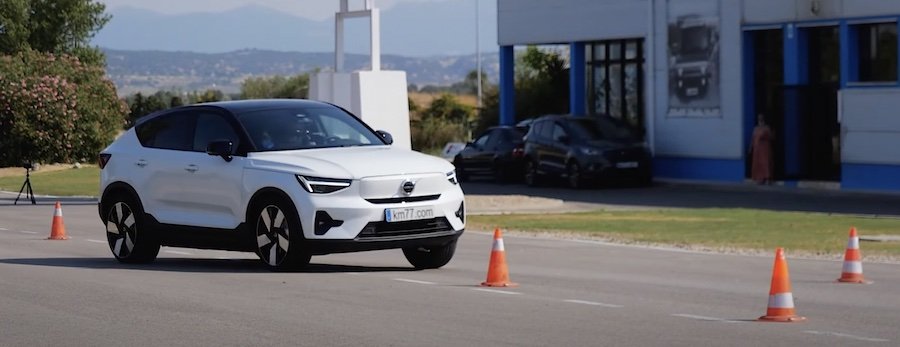Volvo C40 Recharge Performs Poorly In The Moose Test

As more EVs get introduced, a handful of them had already gone through the dreaded moose test. Designed to check if a car can safely maneuver away from a sudden obstacle (and return to the lane after), electric vehicles usually ace the moose test. Even higher crossover EVs perform generally well – except the Volvo C40 Recharge that recently got tested by the folks from YouTube's km77.com.
Introduced last year for the 2022 model year, the Volvo C40 Recharge is the coupe version of the XC40 Recharge. The variant tested by km77.com was fully equipped and was wearing Pirelli PZero Elect tires. The car was in Normal mode while on the duration of the test.
At the benchmark speed of 77 kilometers per hour (47.8 miles per hour), the C40 Recharge failed, with the tester noting that there was too much understeer. The reactions of the car were said to be normal, though it was said the tires and temperature that day could be a factor in the failed attempts. However, the lack of reaction from the car's ESC was also noted to be a factor.
The best attempt was done at 70 km/h (43.5 mph), which was a bit low compared to other cars within its class.
In comparison, the Tesla Model Y aced the moose test before, completing the maneuver at 83 km/h (52 mph). Other crossover EVs like the VW ID.4 and Mazda MX-30 also fared notably well but not any better than what the Tesla crossover EV has achieved so far. Meanwhile, the Kia EV6 also recently completed the test at a passing speed of 78 km/h (48.5 mph).
This shows that the low center of gravity isn't the only factor for a vehicle to pass the dreaded moose test. Electronic aids also affect the results but more importantly, the traction that the tires employ.
Related News
